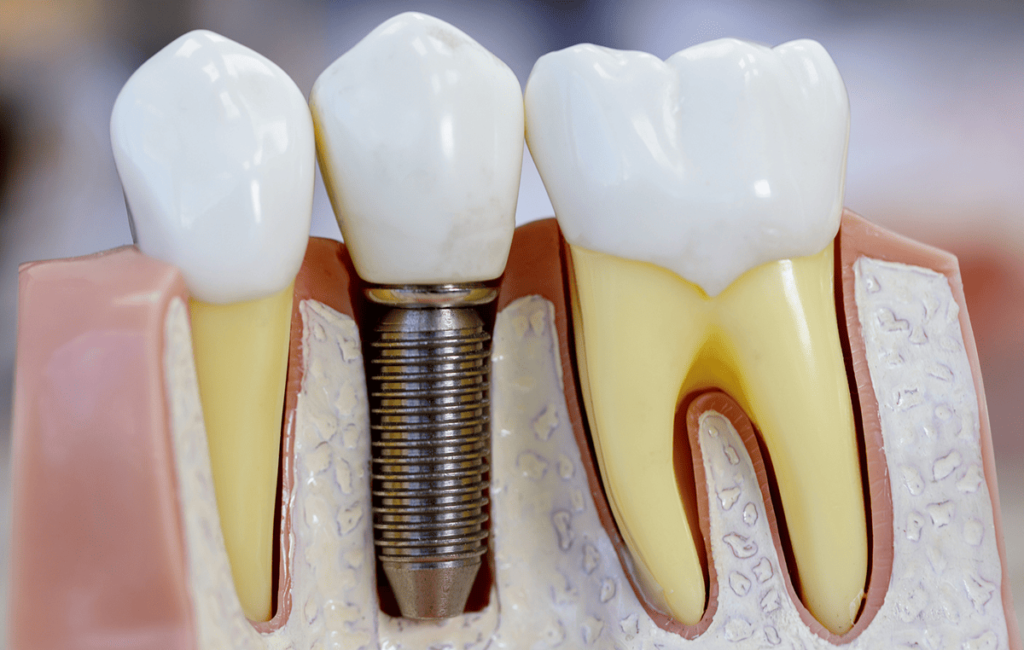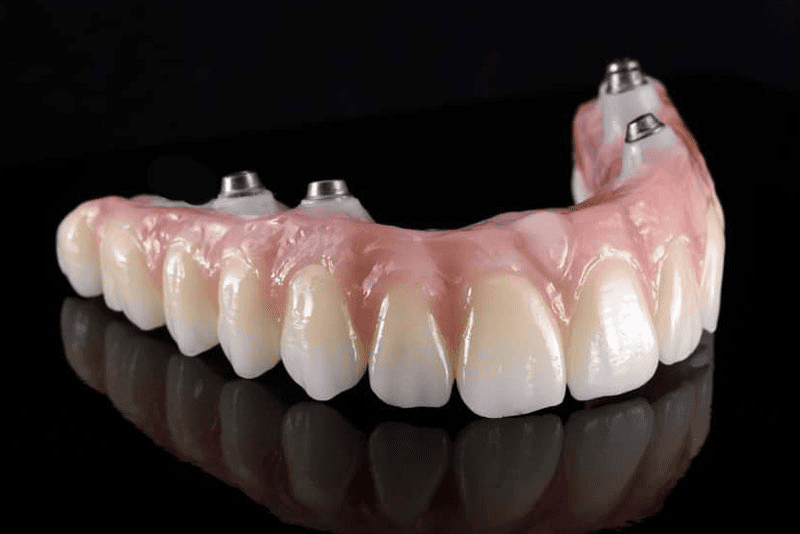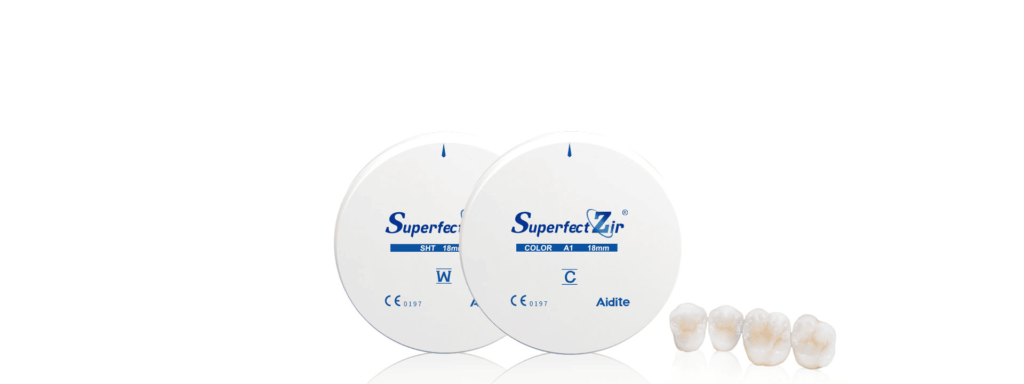Dental implants are a surgical method to replace missing teeth. Titanium has been used in dental implants for a long time. However, a new implant material zirconia has provided a metal-free alternative to traditional materials. In recent years, zirconia dental implants have gained a lot of popularity. If you are looking for a time-tested solution then titanium dental implants are right for you. Before deciding on a material it is important to consult a dentist to make sure the material aligns with your requirements.
In this article, we’ll explore the key differences between zirconia vs titanium dental implants.

Zirconia Dental Implants
Zirconium dioxide is a high-strength ceramic material that is used to make zirconia dental implants. Zirconia Material provides an alternative to metal tooth replacements. Zirconia implants provide strength as well as aesthetics. Since zirconia is a white material it blends in with natural teeth. Zirconia Implants look natural and blend well with gums. There are two main parts of zirconia implant the implant body and the abutment. The implant body is surgically placed in the jawbone. The abutment
connects the implant to the replacement tooth.
Based on the number of pieces, the following are two types of zirconia dental implants:

One Piece Zirconia Implants (Monolithic)
One-piece zirconia implants are made from a single solid piece of zirconia. Monolithic implants have the body and abutment fused. The main advantage of this design is that it eliminates the micro-gaps between parts. So there is less risk of bacteria buildup and infection.
Two Piece Zirconia Implants
Two-piece zirconia implants are made of two separate components. By surgical methods, the implant body is placed in the jawbone. After a while, it bonds with the bone. Then the abutment is attached to the implant body. This approach allows for customized solutions for patients.
Drawbacks of Zirconia Dental Implants
- In dental restorations, zirconia is a new material. So there is not enough data available to support the long-term success of zirconia dental implants.
- Under high stress, zirconia forms tiny cracks.
- Zirconia is hard and it can cause wear on the opposing teeth.
- Being a new material, access to zirconia implants can be limited.
Titanium Dental Implants
Titanium alloy has been used to make titanium dental implants for years. It has been a gold standard in dentistry for decades. Titanium is a strong, biocompatible, and lightweight material. However, it does have some limitations.

Benefits of Titanium Dental Implants
The following are the advantages of choosing titanium dental implants:
- It is biocompatible which means that it does not cause harm to the living tissues. It integrates well with the body which leads to strong tooth replacement.
- Titanium is a strong material and it can withstand daily chewing forces.
- Its success has been proved by various clinical studies.
Drawbacks of Titanium Dental Implants
Some drawbacks of titanium dental implants are:
- There are some risks associated with the surgical placement of titanium dental implants. Even if the risk is lower it can cause complications.
- Some patients can develop allergic reactions to titanium.
Zirconia vs Titanium Dental Implants: Key Differences
Let’s look at the key differences between zirconia vs titanium dental implants:
Longevity and Track Record
Titanium implants have been used for a long time in dentistry. Their long history makes them a trusted option for many dental professionals. However, zirconia implants have shown great success in a short period of time.
Material Properties
Zirconia vs titanium dental implants are made of different materials. Titanium is ceramic while zirconia is metal. Like other metals, titanium is highly resistant to corrosion and stays stable over time. Zirconia is an attractive choice for people seeking a metal-free solution.

Cost Considerations
The zirconia vs titanium implants cost varies based on factors like your location. Due to established manufacturing processes titanium implants cost less than zirconia implants. Titanium implants can cost $1000 to $5000. Zirconia implants cost $1500 to $7000.
Aesthetic Differences
The major difference between zirconia and titanium is their aesthetic appeal. Titanium has a visible dark edge at the gum line as the gums recede over time.
One of the biggest advantages of zirconia is its natural appeal. Zirconia dental implants are white and blend with other teeth very smoothly.
Why is Zirconia preferred over Titanium?
Following are the reasons why zirconia is preferred when comparing zirconia vs titanium dental implants:
- Biocompatibility
Some people have metal allergies, so they cannot get titanium implants. Zirconia is the perfect metal-free solution for them. Zirconia is also biocompatible and it does not cause any unwanted reactions in the body.
- Aesthetic Appeal
One downside of titanium implants is their appearance. They have a visible dark edge. This makes them unsuitable for anterior restorations. In terms of aesthetic appeal, zirconia vs titanium implants favor zirconia.
- Low Plaque Affinity
Bacteria need a rough surface to stick. Zirconia is the opposite of that, it has a smooth surface. Bacteria won’t stick to your dental implant. So, your gums stay healthy and your oral health improves.
- Corrosion Resistance
The moist environment of the mouth is perfect for corrosion. So the material used for dental implants should be highly corrosion-resistant. Zirconia is bioinert and doesn’t corrode. It also stays in place and doesn’t migrate to other parts of the body.
- Strength and Durability
The material used is very important since chewing puts a lot of power on teeth. It must be durable, dependable, and long-lasting. Aidite zirconia can help with that. Without sacrificing appearance, Aidite dental zirconia offers an unparalleled strength of 1300MPa. You may be sure that your dental implants will endure throughout time thanks to our cutting-edge zirconia.

- Better Osseointegration
The process by which an implant joins the jawbone to form a solid and safe base is known as osseointegration. Zirconia dental implants are known for their excellent osseointegration, promoting strong bone bonding and long-term stability.
FAQs about Zirconia vs Titanium Dental Implants
Are zirconia implants more expensive than titanium?
Yes, zirconia implants tend to be more expensive than titanium implants. Titanium implants cost $1000 to $5000 while zirconia implants cost $1500 to $7000.
What is the difference between zirconia and titanium implants?
The main difference between zirconia and titanium implants is the material. Zirconia is a ceramic material while titanium is metal.
Is zirconia better than titanium?
If you are looking for implants that are strong, durable, and aesthetically pleasing then zirconia might be a better choice. However, it’s important to consult a dentist before deciding on a material.
Conclusion
Traditionally titanium is used for dental implants. With advancements in dentistry, new materials are being introduced. Zirconia is one of them. Zirconia is becoming a popular material for dental restorations including implants. If you are allergic to metal zirconia provides metal-free restorations. When comparing zirconia vs titanium dental implants, zirconia stands out. The reason behind this is strength, aesthetics, better osseointegration, and low plaque affinity. But it is very important to choose high-quality dental zirconia. Aidite Dental offers dental zirconia products for varying clinical requirements. In a nutshell, zirconia is better than titanium implants. But remember before making any decision it is very important to consult with a dentist.



